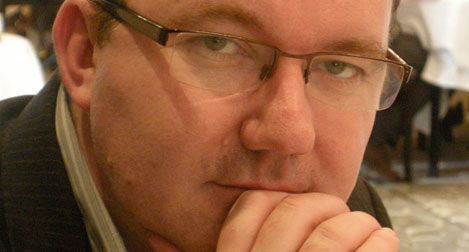Ian Haydn Smith
As he heads to Yerevan, Armenia to stage a ten-day workshop in film criticism alongside a festival of British film, journalist, academic and curator Ian Haydn Smith reveals the films that have inspired him.
What’s your connection to the British Council?
After being commissioned to write an article on British cinema, I was invited to lecture on screen adaptations of Charles Dickens' novels and the films of Alfred Hitchcock at various European events. I then curated a programme of documentary films to accompany an exhibition of British photography in the 20th century, which showed in Brazil and ended the year attending festivals in Dubai and Kiev. In the coming year I will be attending a number of film festivals to help create a series of workshops for budding journalists and film practitioners.
What’s your current project?
A ten-day workshop with students in Yerevan, Armenia, to coincide with a festival of British films.
What/who originally turned you onto film?
My father. I watched Sergio Leone's The Good, the Bad and the Ugly with him when I was 9 years old and thought it was the most exciting thing I had ever seen. It also gave me with an unhealthily high tolerance for screen violence and, for a number of years, had me believing that only men with permanently stubbled faces were allowed to appear in films. Then I watched a Preston Sturges' The Lady Eve and a whole other world opened up to me.
What was your first job in the film industry?
Writing film reviews for an international news agency. I hope those pieces have long since disappeared.
If I knew then what I know now…
What might seem insignificant can lead, at the very least, to some fascinating encounters. Also, never ask a film star as successful as Isabelle Huppert if she was a director's first choice for a role. 6. What is your favourite British film? Why? There are two: Powell and Pressburger's A Canterbury Tale and Robert Hamer's Kind Hearts and Coronets. Both display a visual elegance matched by lyrical, near-perfect scripts. Eric Portman and Dennis Price are charming rogues (although Kind Hearts wins in the acting stakes, thanks to Alec Guiness appearing in 8 different roles). They're also sophisticated subversions of picture postcard England.
If you could have directed/been involved with any film ever made, which one would it be?
Louis Malle's Lift to the Scaffold. To be in the recording studio when Miles Davis recorded the score as he watched the film for the first time would have been sublime. Then hanging out in Parisian jazz clubs with Malle and the film's luminous star Jeanne Moreau as they watched Miles' band play.
What’s the first film you remember seeing?
Disney's The Jungle Book. It was riveting. Who couldn't love a film with that music!
What’s your favourite line or scene from a film?
Again, it's between two: Elaine May's Ishtar, when Warren Beatty says to Dustin Hoffman's near-suicidal character, "It takes a lot of nerve to have nothing at your age, don't you understand that? Most guys'd be ashamed, but you've got the guts to just say 'to hell with it'. You say that you'd rather have nothing than settle for less"; or Billy Wilder's Ace in the Hole, when a tough Jan Sterling says to a cynical Kirk Douglas "I've met a lot hard boiled eggs in my time, but you – you're 20 minutes."
Favourite screen kiss?
George Lazenby and Diana Rigg in On Her Majesty's Secret Service. They loathed each other yet manage to be utterly convincing in a clinch. Which was some feat as Diana Rigg had consumed a few cloves of raw garlic beforehand to ensure Lazenby didn't enjoy the experience.
Who’s your favourite screen hero and/or villain?
Anton Walbrook in The Red Shoes because: of his irascible charm; few people have looked better in formal dress; no one has ever used the words 'Good Morning' to simultaneously greet and dismiss, and he has the air of a man who would never feel the need to run, even if the house he was residing in was on fire.
Who would play you in the film about your life and why?
Anton Walbrook. For all of the above. And if he wasn't available, James Mason.


